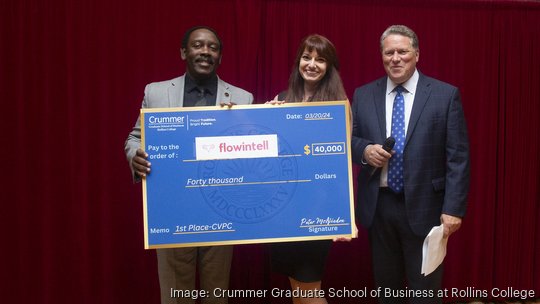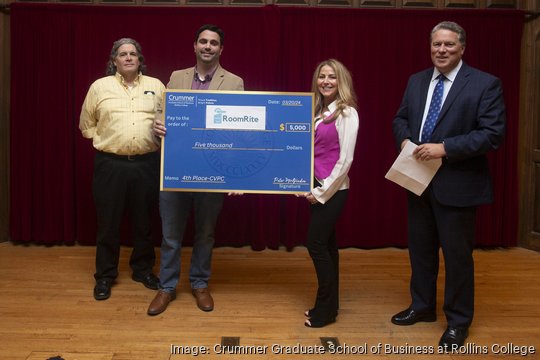
Flowintell, an Orlando startup developing an innovative endometriosis test using menstrual blood, won the 2024 Crummer Venture Plan Competition, a business plan and pitch competition that was held on the Rollins College campus on March 20.
The company will receive $40,000 in prize money, but Flowintell isn’t the only winner. The startups placing second, third and fourth also took home winnings: $20,000, $10,000 and $5,000 respectively. They are Pete Learning, an AI-powered course creation platform; Silicon Assurance, a security assurance solution for silicon chips; and RoomRite, the leading online resale marketplace for hotel room blocks.
2024 Crummer Venture Plan Competition winners
Originally, the competition was only open to students at Crummer Graduate School of Business. Then, in 2012, the school decided to open it up to the local community of startup founders.
Over the years, some companies that won the competition fared very well in the marketplace, like Ease Applications, which was acquired by Vocera Communications for $25 million in 2020.
Ease Applications’ product — now called Vocera Ease — is a HIPAA-compliant software platform that allows patients to share updates about their status with friends and family. Flowintell, another healthcare brand, seeks to inform women with endometriosis about their illness through non-invasive at-home testing and educational content. Endometriosis is an underdiagnosed condition in which endometrium grows outside the uterus, causing pain, gastric distress and difficulty getting pregnant.
Orlando Inno spoke with Flowintell CEO Jessica King to learn how she’s gotten to this point and what’s ahead.
What’s your personal connection to endometriosis?
I was at Harvard and three of my friends in their 30s and 40s were having trouble conceiving. One by one they were diagnosed with endometriosis. That was the first time that the word ‘endometrioses’ ever popped up on their radars. I had learned about it ten years prior because I had done some research, but it never got funding from an outside institution because nobody really funds women's health.
How is endometriosis typically diagnosed?
Through laparoscopic surgery, which is expensive and invasive. A surgeon makes a small incision near the naval and inserts a viewing instrument called a laparoscope that helps the surgeon identify endometriosis tissue.
Why hasn't a non-invasive test been developed before?
In many cases, endometriosis symptoms have been normalized, and women don’t know what’s normal versus what’s abnormal. Because of that, there's not a big push for it. Women aren't talking about it. The second reason is that there's not a lot of funding for it. Third, there's no cure for endometriosis, so some people don't want to check for something that there's no cure for. [Also], some doctors are very dismissive. Even though there’s no cure, having an accurate diagnosis can be the difference between depression and mental health, thinking that there's something wrong with you as a person versus being able to attribute it to something.
What distinguishes the Flowintell test?
It's completely non-invasive. Just as a pregnancy test checks urine for a particular growth hormone and a Covid-19 test checks for a genetic material (RNA) from the virus, Flowintell's endometriosis test checks menstrual blood for certain inflammatory biomarkers.
Where are you in the product development process?
We have manufactured 60 tests and we’re adding our proprietary reactive nanoparticle to them. That’s the chemical that reacts to inflammatory biomarkers and indicates that a woman has endometriosis. We're looking to do a few things in the process between now and 2026 when we put the product on the market. One is usability, such as making sure that women are comfortable diluting and handling their menstrual blood in the manner they need to.
How are you establishing your pricing?
We looked at the B2B supply chain, and we ended up deciding it is better to sell directly to consumers. We’re modeling Flowintell after the home testing company Everlywell. Their hormone tests range from $150 to $400. So, our $299 was a good option. We're estimating that our units are $55 for each test and that includes shipping it out.
Sign up here for The Beat, Orlando Inno’s free newsletter. And be sure to follow us on LinkedIn, Facebook and Twitter.









